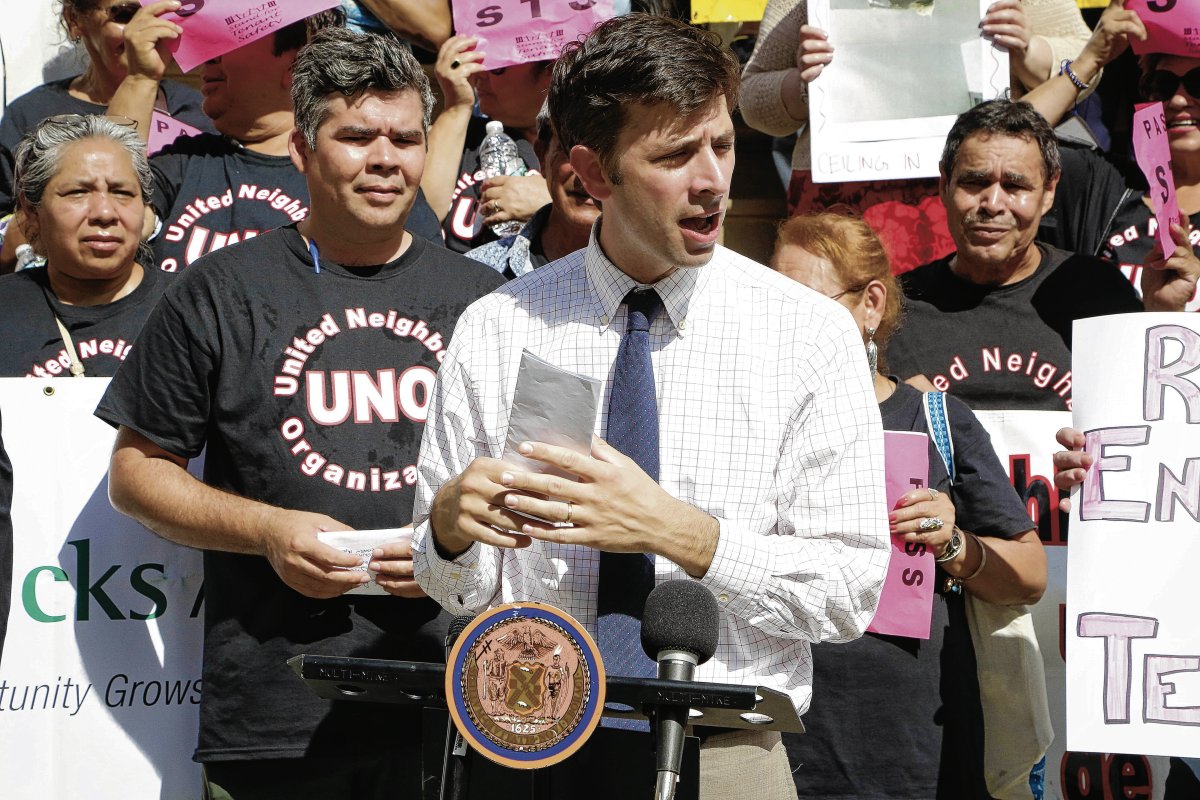
BY EILEEN STUKANE | Tenants subjected to dangerous and intentionally demoralizing conditions were recently given new hope, in the form of legislation designed to, among other things, mitigate “construction as harassment.”
The tactic is employed by landlords and building owners in which unpleasant living conditions are used to harass rent-regulated tenants until they move out, so the units can be rented or sold at market-rate prices.
The last of the 12 Stand for Tenant Safety (STS) Coalition’s bills was passed by the City Council on Sept. 27 — a hard-won victory for detecting landlord abuses, enforcing existing policies and protecting tenants.
Sponsored by Brooklyn Councilmember Stephen Levin, this last bill will create a Real Time Enforcement Unit, or R.T.E.U., at the Department of Buildings — which will follow up with inspections within a short period of time after receiving complaints about work being done without a permit.
A month earlier, on Aug. 30, Mayor Bill de Blasio signed into law 18 pieces of tenant safety legislation that included 11 of the 12 S.T.S.-generated bills. Among the other seven bills signed by the mayor was one sponsored by Upper West Side Councilmember Helen Rosenthal, which created a new Office of Tenant Advocate, a watchdog division for tenants at D.O.B. D.O.B. historically has been a monitor of building practices, such as codes, zoning, permits and construction-safety issues.
Growing tenant complaints about construction as harassment and falsified permits have forced D.O.B. to look beyond its usual agendas, yet the issues have not abated.
STS (standfortenantsafety.com) is a coalition of nearly 30 organizations. It has been a four-year march toward the accomplishment of this legislation. Brandon Kielbasa is director of organizing at Cooper Square Committee, one of the coalition members.
“We’re not at all viewing this as the end of the road but as reaching a milestone in the campaign,” he said. “The campaign will change focus now. We’re going to go crazy spreading the word in the next year. We’ll create materials, do tenant information sessions, just spread the word like mad.”
Councilmembers have been inundated by tenant associations and community organizations with individual stories of impossible living conditions, such as lack of cooking gas, toxic dust and fumes, collapsed ceilings and walls, broken windows, vermin and relentless jackhammering, all conducted by landlords who want to drive tenants out of their homes.
“The reality is that these problems are really plaguing the entire city for the most part,” Kielbasa said. “Anyplace that has rent regulation is starting to see them.”
He explained that core neighborhoods with overheated housing markets are seeing construction as harassment in higher volume. Neighborhoods that are rezoned and, as a result, facing development, are also prime targets.
The Tenant Harassment Prevention Task Force, established in 2015 as a collection of state and city agencies headed by the state Attorney General’s Office, investigates and brings actions, including criminal charges, against landlords who harass tenants. Recently, the task force found Icon Realty Management guilty of multiple violations, including hazardous conditions, and ordered Icon to pay $500,000 in fees and fines. However, this task force cannot do it all.
“As much as we’re really glad to have the attorney general and the Tenant Protection Unit going after landlords,” Kielbasa said, “they’re looking at specific ones and saying, ‘We’re going to take this one on because this is a clear case.’ That is really welcome enforcement. The reality is that they can’t take on all of them because there are just so many bad-acting landlords who employ this stuff in these hot neighborhoods.”
Enter the R.T.E.U. and the Office of Tenant Advocate. Within the D.O.B. the staffing of the two new divisions, the R.T.E.U. and the Office of Tenant Advocate, is unknown as yet. The Office of Tenant Advocate is due to take effect on Dec. 28.
Now that the Office of Tenant Advocate has been legislated, D.O.B. spokesperson Andrew Rudansky e-mailed this statement: “We are currently reviewing the legislation and its implementation. Tenants who believe they are being harassed by their landlord should report it to 311 immediately, and we will send an inspector to investigate.”
Rosenthal is energized to help model the Office of Tenant Advocate similarly to the Mayor’s Office of Special Enforcement, which has the ability to shut down locations in which illegal activities are taking place and bring unsafe conditions into compliance. Her hope is that the Tenant Advocate could be accessed via 311, and also online through a D.O.B. dropdown menu — a link on the D.O.B. Web site that creates a level of priority for tenants looking for help.
Until now, the D.O.B.’s concern has mostly been focused on construction safety.
“Safety is not just for residents walking under a sidewalk shed,” Rosenthal noted. “It’s also for residents who live right next door where a building owner is trying to harass them out.”
The two new D.O.B. divisions, the R.T.E.U. and the Office of Tenant Advocate, along with the strengthened laws — including creating a multiagency task force to monitor construction work, enforcing liens against landlords who ignore fines, cracking down on work done without a permit, and preventing falsified permit claims that a building is unoccupied — are designed to change the culture of construction.
































